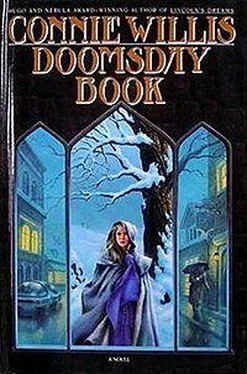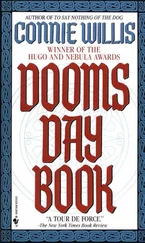"What is it?" she said. "Are you ill?"
He shook his head. He opened his mouth and then closed it again.
"Has someone come?" she said, scrambling to her feet.
He shook his head again.
It can't be someone ill, she thought. There's no one left. She looked at the pile of blankets by the door where the steward slept, but he wasn't there. "Is the steward ill?"
"The steward's son is dead," he said in an odd, stunned voice, and she saw that he was gone, too. "I went to the church to say matins — " Roche said, and his voice faltered. "You must come with me," he said and strode out.
Kivrin snatched up her ragged blanket and hurried out into the courtyard after him.
It could not be later than six. The sun was only just above the horizon, staining the overcast sky and the snow with pink. Roche was already disappearing through the narrow passage to the green. Kivrin flung the blanket over her shoulders and ran after him.
The steward's cow was standing in the passage, her head through a break in the fence of the pig sty, pulling at the straw. It raised its head and mooed at Kivrin.
"Shoo!" she said, flapping her hands at it, but it only pulled its head out of the wattle fence and started toward her, lowing.
"I don't have time to milk you," she said, and shoved her hindquarters out of the way and squeezed past.
Father Roche was halfway across the green before she caught up with him. "What is it? Can't you tell me?" she asked, but he didn't stop or even look at her. He turned toward the line of graves on the green, and she thought, feeling suddenly relieved, the steward's tried to bury his son himself, without a priest.
The small grave was filled in, the snowy dirt mounded over it, and he had finished Rosemund's grave and dug another, larger one. The spade was sticking out of it, its handle leaning against the end.
Roche didn't go to Lefric's grave. He stopped at the newest one, and said, in that same stunned voice, "I went to the church to say matins — ", and Kivrin looked into the grave.
The steward had apparently tried to bury himself with the shovel, but it had proved unwieldy in the narrow space, and he had propped it against the end of the grave and begun pulling the dirt down with his hands. He held a large clod in his frozen hand.
His legs were nearly covered, and it gave him an indecent look, as if he were lying in his bath. "We must bury him properly," she said, and reached for the shovel.
Roche shook his head. "It is holy ground," he said numbly, and she realized that he thought the steward had killed himself.
It doesn't matter, she thought, and realized in spite of everything, horror after horror, Roche still believed in God. He had been going to the church to say matins when he found the steward, and if they all died, he would go on saying them and not find anything incongruous in his prayers.
"It's the disease," Kivrin said, though she had no idea whether it was or not. "The septicemic plague. It infects the blood."
Roche looked at her uncomprehendingly.
"He must have fallen ill while he was digging," she said. "Septicaemic plague poisons the brain. He was not in his right mind."
"Like Lady Imeyne," he said, sounding almost glad.
He didn't want to have to bury him outside the pale, Kivrin thought, in spite of what he believes.
She helped Roche straighten the steward's body a little, though he was already stiff. They did not attempt to move him or wrap him in a shroud. Roche laid a black cloth over his face, and they took turns shoveling the dirt in on him. The frozen earth clattered like stones.
Roche did not go to the church for his vestments or the missal. He stood first beside Lefric's grave and then the steward's and said the prayers for the dead. Kivrin, standing beside him, her hands folded, thought, he wasn't in his right mind. He had buried his wife and seven children, he had buried almost everyone he knew, and even if he hadn't been feverish, if he had crawled into the grave and waited to freeze to death, the plague had still killed him.
He did not deserve a suicide's grave. He doesn't deserve any grave, Kivrin thought. He was supposed to go to Scotland with us, and was horrified at the sudden shock of delight she felt.
We can go to Scotland now, she thought, looking at the grave he had dug for Rosemund. Rosemund can ride the donkey, and Roche and I can carry the food and blankets. She opened her eyes and looked at the sky, but now that the sun was up, the clouds looked lighter, as if they might break up by mid-morning. If they left this morning, they could be out of the forest by noon and onto the Oxford-Bath road. By night they could be on the highway to York.
" Agnus dei, qui tollis peccata mundi ," Roche said, " dona eis requiem ."
We must take oats for the donkey, she thought, and the ax for cutting firewood. And blankets.
Roche finished the prayers. " Dominus vobiscum et cum spiritu tuo ," he said. " Requiescat in pace. Amen ." He started off to ring the bell.
There isn't time for that, Kivrin thought, and then took off toward the manor. She could be half packed by the time Roche had tolled the death knell, and she could tell him her plan, and he could load the donkey, and they could go. She ran across the courtyard and into the manor. They would have to take coals to start the fire with. They could use Imeyne's casket.
She went into the hall. Rosemund was still asleep. That was good. There was no point in waking her until they were ready to leave. She tiptoed past her and got the casket and emptied it out. She laid it next to the fire and started out to the kitchen.
"I woke and you were not here," Rosemund said. She sat up on her pallet. "I was afraid you had gone."
"We're all going," Kivrin said. "We're going to go to Scotland." She went over to her. "You must rest for the journey. I will be back in a bit."
"Where are you going?" Rosemund said.
"Only to the kitchen. Are you hungry? I will bring you some porridge. Now lie down and rest."
"I do not like to be alone," Rosemund said. "Can you not stay with me a little?"
I don't have time for this, Kivrin thought. "I'm only going to the kitchen. And Father Roche is here. Can't you hear him? He's ringing the bell. I'll only be a few minutes. All right?" She smiled cheerfully at Rosemund, and she nodded reluctantly. "I'll be back soon."
She nearly ran outside. Roche was still ringing the death knell, slowly, steadily. Hurry, she thought, we don't have much time. She searched the kitchen, setting the food on the table. There was a round of cheese and plently of manchets left — she stacked them like plates in a wadmal sack, put in the cheese, and carried it out to the well.
Rosemund was standing in the door of the manor, holding onto the jamb. "Can I not sit in the kitchen with you?" she asked. She had put on her kirtle and her shoes, but she was already shivering in the cold air.
"It is too cold," Kivrin said, hurrying over to her. "And you must rest."
"When you are gone, I fear you will not come back," she said.
"I'm right here," Kivrin said, but she went inside and fetched Rosemund's cloak and an armload of furs.
"You can sit here on the doorstep," she said, "and watch me pack." She put the cloak over Rosemund's shoulders and sat her down, piling the furs about her like a nest. "All right?"
The brooch that Sir Bloet had given Rosemund was still at the neck of the cloak. She fumbled with the fastening, her thin hands trembling a little. "Do we go to Courcy?" she asked.
"No," Kivrin said, and pinned the brooch for her. Io suiicien lui dami amo . You are here in place of the friend I love. "We're going to Scotland. We will be safe from the plague there."
"Think you my father died from the plague?"
Читать дальше












